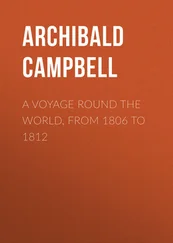George Anson - A Voyage Round the World
Здесь есть возможность читать онлайн «George Anson - A Voyage Round the World» — ознакомительный отрывок электронной книги совершенно бесплатно, а после прочтения отрывка купить полную версию. В некоторых случаях можно слушать аудио, скачать через торрент в формате fb2 и присутствует краткое содержание. ISBN: , Жанр: foreign_antique, foreign_prose, на английском языке. Описание произведения, (предисловие) а так же отзывы посетителей доступны на портале библиотеки ЛибКат.
- Название:A Voyage Round the World
- Автор:
- Жанр:
- Год:неизвестен
- ISBN:http://www.gutenberg.org/ebooks/47130
- Рейтинг книги:3 / 5. Голосов: 2
-
Избранное:Добавить в избранное
- Отзывы:
-
Ваша оценка:
- 60
- 1
- 2
- 3
- 4
- 5
A Voyage Round the World: краткое содержание, описание и аннотация
Предлагаем к чтению аннотацию, описание, краткое содержание или предисловие (зависит от того, что написал сам автор книги «A Voyage Round the World»). Если вы не нашли необходимую информацию о книге — напишите в комментариях, мы постараемся отыскать её.
A Voyage Round the World — читать онлайн ознакомительный отрывок
Ниже представлен текст книги, разбитый по страницам. Система сохранения места последней прочитанной страницы, позволяет с удобством читать онлайн бесплатно книгу «A Voyage Round the World», без необходимости каждый раз заново искать на чём Вы остановились. Поставьте закладку, и сможете в любой момент перейти на страницу, на которой закончили чтение.
Интервал:
Закладка:
A more tragical matter took place in this November. A Mr. McKie, a naval mate, was attacked on Gosport Beach by twenty or thirty of the Centurion's crew, under one William Cheney, a boatswain's mate; and the said William Cheney "with a stick did cutt and bruse" the said McKie, and tore his shirt and conveyed away his "Murning ring," which was flat burglary in the said Cheney. "Mr. Cheney aledges no other reason for beating and Abusing Mr. McKie but the said McKie having got drunk at Sea, did then beat and abuse him." As Hamlet says, this was hire and salary, not revenge.
Months went by, doubtfully enlivened thus, till June 1740, when the pressing of men began. The Centurion's men went pressing, and got seventy-three men, a fair catch, but not enough. She despatched a tender to the Downs to press men from homeward bound merchant ships. This method of getting a crew was the best then in use, because the men obtained by it were trained seamen, which those obtained from the gaols, the gin-shops, and the slums seldom were. It was an extremely cruel method. A man within sight of his home, after a voyage of perhaps two years, might be dragged from his ship (before his wages were paid) to serve willy-nilly in the Navy, at a third of the pay, for the next half-dozen years. An impartial conscription seems noble beside such a method. Knowing how the ships were manned, it cannot seem strange that the Navy was not then a loved nor an honoured service. Nineteen of the Centurion's catch loved and honoured it so little that they contrived to desert (risking death at the yard-arm by doing so) during the weeks of waiting at Portsmouth.
Before the tender sailed for the Downs, Anson discovered that the dockyard men had scamped their work in the Centurion . They had supplied her with a defective foremast "Not fitt for Sarves." High up on the mast was "a rotten Nott eleven inches deep," a danger to spar and ship together. The dockyard officials, who had probably pocketed the money for a good spar, swore that the Nott only "wants a Plugg drove in" to be perfection. Dockyard men at this time and for many years afterwards deserved to be suspended both from their duties and by their necks. Soon after the wrangle over the spar, there was a wrangle about the Gloucester's beef. Forty-two out of her seventy-two puncheons of beef were found to be stinking. With some doubts as to what would happen in the leaf if such things happened in the bud, Anson got his squadron to sea. Early in the voyage his master "shoved" his boatswain while he was knotting a cable, and the boatswain complained. "The Boatswain," says the letter, "is very often Drunk and incapable of his Duty." Later in the voyage, when many hundreds had died, Mr. Cheney, who hit Mr. McKie, became boatswain in his stead.
The squadron sailed from England on September 18, 1740, with six ships of war manned by 1872 seamen and marines, twenty-four of whom were sick. At Madeira, on November 4, after less than seven weeks at sea, there were 122 sick, and fourteen had been buried. Less than eleven weeks later, at St. Catherine's in Brazil, there were 450 sick, and 160 had been buried. From this time until what was left of the squadron reached Juan Fernandez, sickness and death took continual toll. It is shocking to see the Centurion's muster lists slowly decreasing, by one or two a week, till she was up to the Horn, then dropping six, ten, twenty, or twenty-four a week, as the scurvy and the frost took hold. Few but the young survived. What that passage of the Horn was like may be read here at length; but perhaps nothing in this book is so eloquent of human misery as the following entries from Anson's private record: —
"1741. 8 May. – Heavy Flaws and dangerous Gusts, expecting every Moment to have my masts Carry'd away, having very little succor, from the standing rigging, every Shroud knotted, and not men able to keep the deck sufficient to take in a Topsail, all being violently afflicted with the Scurvy, and every day lessening our Number by six eight and Ten.
"1741. 1st Sept. – I mustered my Ship's Company, the number of Men I brought out of England, being Five hundred, are now reduced by Mortality to Two hundred and Thirteen, and many of them in a weak and Low condition."
Nothing in any of the records is so eloquent as the remark in Pascoe Thomas's account of the voyage: —
"I have seen 4 or 5 dead Bodies at a time, some sown up in their Hammocks and others not, washing about the Decks, for Want of Help to bury them in the Sea."
On December 7, 1741, the 1872 men had dwindled down to 201. Of the six ships of war only one, the Centurion , still held her course. She was leaking an inch an hour, but she showed bright to the world under a new coat of paint. On this day Anson sent home a letter to the Admiralty (from Canton in China). The letter was delivered 173 days later.
In spite of the miseries of the service, there were compensations. The entry off Payta —
"1741. 12 Nov. – I keept Possession of the Town three days and employed my Boats in plundering" —
must have been pleasant to write; and the entries for Tuesday, June 21, 1743, and following days, become almost incoherent: —
"reced 112 baggs and 6 Chests of Silver.
"11 Baggs of Virgin silver 72 Chests of Dollers and baggs of Dollers 114 Chests and 100 baggs of Dollers 4 baggs of wrought Plate and Virgin Silver."
The arrival at Portsmouth is thus described: —
"1744. Friday, 15 June. – Came to with the S Bower in 10 fath water and at 9 began to Moor."
Later interesting entries are: —
"Monday, 2nd July. – Fresh gales and Cloudy sent away the Treasure in 32 Waggons to London with 139 Officers and Seamen to guard it.
"Thursday, 19 July. – Mod and fair, found in the Fish Room three Chests of Treasure" (which had been overlooked).
The last entry of all is for: —
"Friday, 20 July. – Hard Gales with rain at 4 p.m. all the men on the spot were paid and the Pendant was Struck."
An old print represents an officer of the Centurion dropping booty into the apron of a lady friend. Behind him the waggons and their guard proceed, with a great display of flags. The passing of the treasure was acclaimed with much enthusiasm both upon the road and in London. It was no doubt the biggest prize ever brought to England by a single ship. Anson's share made him a rich man. The rest of the survivors profited according to their rank.
Anson's subsequent career may be told in a few words. He was created Lord Anson on June 13, 1747. From 1751 to 1756 and from 1757 till his death he was a very competent and energetic First Lord of the Admiralty. He became Admiral of the Fleet in 1761. He died on June 6, 1762. The figurehead of the Centurion , the lion which "was very loose" in the Cape Horn storms of 1741, was preserved at the family seat at Shugborough till it fell to pieces. A portrait of Anson, which has been frequently copied and engraved, still exists there. The face is that of a man placidly and agreeably contented. It is the face of the polite and even spirit who "always kept up his usual composure and steadiness," and only once allowed joy to "break through" "the equable and unvaried character which he had hitherto preserved." Something of that character is in this placid and agreeable story told by Mr. Walter, chaplain, from Anson's private records.
The book is one of the most popular of the English books of voyages. It is a pleasantly written work. The story is told with a grace and quietness "very grateful and refreshing." The story itself is remarkable. It bears witness to the often illustrated contrast between the excellence of Englishmen and the stupidity of their governors. The management of the squadron before it sailed gave continuous evidence of imbecility. Something fine in a couple of hundred "emaciated ship-mates" drove them on to triumph through every possible disadvantage. In the general joy over their triumph, the imbecility was forgotten. There is something pathetic in the mismanagement of the squadron. The ships were sent to sea on the longest and most dangerous of voyages with no anti-scorbutics. When scurvy broke out the only medicines available were "the pill and drop of Dr. Ward" (very violent emetic purgatives), which came not from the government, but from Anson's own stores. In the absence of proper medicines, Anson produced these things, "and first try'd them on himself." This spirit in our captains and in our common men has borne us (so far) fairly triumphantly out of the bogs into which our stupidity so often drives us.
Читать дальшеИнтервал:
Закладка:
Похожие книги на «A Voyage Round the World»
Представляем Вашему вниманию похожие книги на «A Voyage Round the World» списком для выбора. Мы отобрали схожую по названию и смыслу литературу в надежде предоставить читателям больше вариантов отыскать новые, интересные, ещё непрочитанные произведения.
Обсуждение, отзывы о книге «A Voyage Round the World» и просто собственные мнения читателей. Оставьте ваши комментарии, напишите, что Вы думаете о произведении, его смысле или главных героях. Укажите что конкретно понравилось, а что нет, и почему Вы так считаете.












